小学英语语法知识讲解一般疑问句的讲解
小学英语语法含有行为动词的一般过去时的一般疑问句
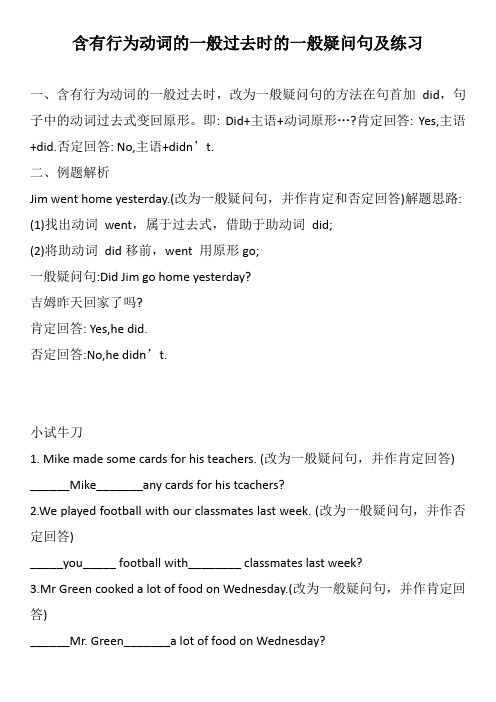
含有行为动词的一般过去时的一般疑问句及练习一、含有行为动词的一般过去时,改为一般疑问句的方法在句首加did,句子中的动词过去式变回原形。
即: Did+主语+动词原形…?肯定回答: Yes,主语+did.否定回答: No,主语+didn’t.二、例题解析Jim went home yesterday.(改为一般疑问句,并作肯定和否定回答)解题思路:(1)找出动词went,属于过去式,借助于助动词did;(2)将助动词did移前,went 用原形go;一般疑问句:Did Jim go home yesterday?吉姆昨天回家了吗?肯定回答: Yes,he did.否定回答:No,he didn’t.小试牛刀1. Mike made some cards for his teachers. (改为一般疑问句,并作肯定回答) ______Mike_______any cards for his tcachers?2.We played football with our classmates last week. (改为一般疑问句,并作否定回答)_____you_____ football with________ classmates last week?3.Mr Green cooked a lot of food on Wednesday.(改为一般疑问句,并作肯定回答)______Mr. Green_______a lot of food on Wednesday?4. I was in the teachers’office just now.(改为一般疑问句,并作否定回答) _____________in the teachers’office just now?5.It rained all day on Children’s Day.(改为一般疑问句,并作否定回答)__________all day on Children's Day?6. They watched cartoons last Sunday.(改为一般疑问句,并作否定回答)____________________________last Sunday?7.I brought some drinks, honey andjiaozi. (改为一般疑问句,并作肯定回答) _____________drinks,honey_________jiaozi?8.Mr. Green lived in a small town.(改为一般疑问句,并作否定回答)______________Mr. Greeen_______a small town?含有行为动词的一般过去时的一般疑问句及其练习参考答案1.Did,make,Yes,he,did2.Did,play,your,No, we,didn't3.Did,cook,Yes,he,did 4.Were you,No,lwasn't5.Did,it,rainNo,itdidn't6.Did,they,watch.cartoons,No,they,didn't 7.Did,you,bring,any,orYes,I,did 8.Did,live,in,No,he,didn't。
疑问句语法讲解及例句

疑问句语法讲解及例句(最新版)编制人:__________________审核人:__________________审批人:__________________编制学校:__________________编制时间:____年____月____日序言下载提示:英语语法是针对英语语言进行研究后,系统地总结归纳出来的一系列语言规则。
英语语法的精髓在于掌握语言的使用。
而且,英语语法是一套完整的语言知识体系。
如果你想英语能够更进一步,英语语法就是其中的主要一环。
Download tips: English grammar is a series of language rules that are systematically summarized after studying the English language. The essence of English grammar lies in mastering the use of language. Moreover, English grammar is a complete language knowledge system. If you want English to go further, English grammar is the main link.正文内容疑问句语法讲解及例句1. 疑问句的定义疑问句的主要交际功能是提出问题,询问情况。
分为一般疑问句、选择疑问句、特殊疑问句和反意疑问句。
2. 一般疑问句一般疑问句通常用来询问一件事情是否属实。
答句通常是"yes或no"。
所以一般疑问句又称作"是非问句"。
一、由肯定的陈述句转化的一般疑问句。
Have you been living here? 你一直住在这儿吗?Do you speak English? 你讲英语吗?二、否定的一般疑问句。
Can't he drive? 他不是会开车吗?Can he not drive? 他不会开车吗?Isn't Kate a student? 凯特难道不是学生吗?Is Kate not a student? 凯特不是学生吗?Hasn't the rain stopped yet? 难道雨还没有停吗?Has the rain stopped yet? 雨还没停吗?三、回答否定形式的一般疑问句的注意事项:Isn't she very intelligent? 她难道不是很聪明吗?Yes, she is. 是的,她很聪明。
英语肯定句、否定句、一般疑问句和特殊疑问句的讲解与练习
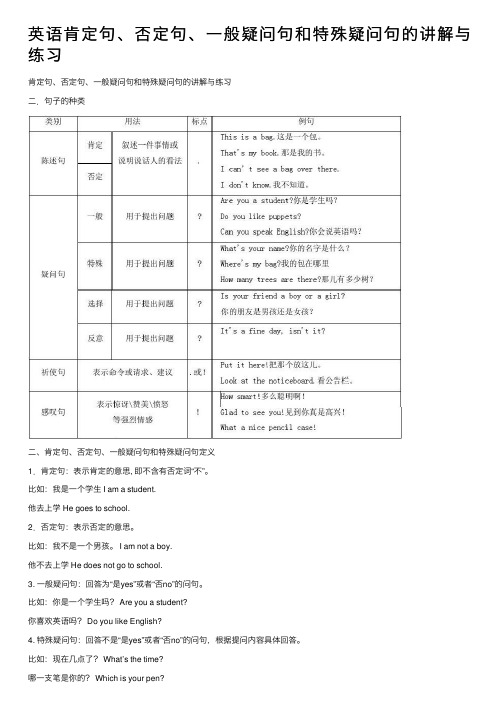
英语肯定句、否定句、⼀般疑问句和特殊疑问句的讲解与练习肯定句、否定句、⼀般疑问句和特殊疑问句的讲解与练习⼆.句⼦的种类⼆、肯定句、否定句、⼀般疑问句和特殊疑问句定义1.肯定句:表⽰肯定的意思, 即不含有否定词“不”。
⽐如:我是⼀个学⽣ I am a student.他去上学 He goes to school.2.否定句:表⽰否定的意思。
⽐如:我不是⼀个男孩。
I am not a boy.他不去上学 He does not go to school.3. ⼀般疑问句:回答为“是yes”或者“否no”的问句。
⽐如:你是⼀个学⽣吗? Are you a student?你喜欢英语吗? Do you like English?4. 特殊疑问句:回答不是“是yes”或者“否no”的问句,根据提问内容具体回答。
⽐如:现在⼏点了? What’s the time?哪⼀⽀笔是你的? Which is your pen?三、肯定句、否定句、⼀般疑问句和特殊疑问句的相互转换肯定句变否定句:在am, is, are 后⾯加上not,其余按顺序照抄。
肯定句变⼀般疑问句:把am, is, are 提前放到句⾸并⼤写Am, Is, Are,其余照抄。
肯定句变特殊疑问句(就划线部分提问):分3步骤第⼀步:先变⼀般疑问句。
第⼆步:找合适的特殊疑问词代替划线部分。
第三步:特殊疑问词提前放到句⾸,并⼤写,其余按顺序照抄,省略划线部分。
注意:1.如:Liming 's not here today. Who's not here today? 今天谁没来?2.划线部分不能在特殊疑问句中出现。
1.肯定句、否定句和⼀般疑问句的互换肯定句:否定句:⼀般疑问句:肯定回答:Yes, it is.否定回答:No, it isn’t.2.就划线部分提问(变特殊疑问句)This is a book.第⼀步:变⼀般疑问句 Is this a book?第⼆步:找合适的特殊疑问词 Is this what ?What is this?do not或者does not,其余按顺序照抄动词⽤原形。
英语语法之疑问句
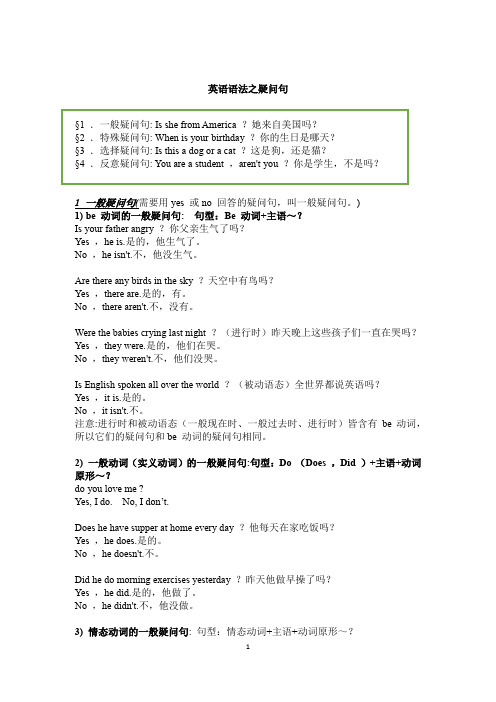
英语语法之疑问句§1 .一般疑问句: Is she from America ?她来自美国吗?§2 .特殊疑问句: When is your birthday ?你的生日是哪天?§3 .选择疑问句: Is this a dog or a cat ?这是狗,还是猫?§4 .反意疑问句: You are a student ,aren't you ?你是学生,不是吗?1 一般疑问句(需要用yes 或no 回答的疑问句,叫一般疑问句。
)1) be 动词的一般疑问句: 句型:Be 动词+主语~?Is your father angry ?你父亲生气了吗?Yes ,he is.是的,他生气了。
No ,he isn't.不,他没生气。
Are there any birds in the sky ?天空中有鸟吗?Yes ,there are.是的,有。
No ,there aren't.不,没有。
Were the babies crying last night ?(进行时)昨天晚上这些孩子们一直在哭吗?Yes ,they were.是的,他们在哭。
No ,they weren't.不,他们没哭。
Is English spoken all over the world ?(被动语态)全世界都说英语吗?Yes ,it is.是的。
No ,it isn't.不。
注意:进行时和被动语态(一般现在时、一般过去时、进行时)皆含有be动词,所以它们的疑问句和be 动词的疑问句相同。
2) 一般动词(实义动词)的一般疑问句:句型:Do (Does ,Did )+主语+动词原形~?do you love me ?Yes, I do. No, I don’t.Does he have supper at home every day ?他每天在家吃饭吗?Yes ,he does.是的。
【免费】小学三年级英语语法:一般疑问句及特殊疑问句
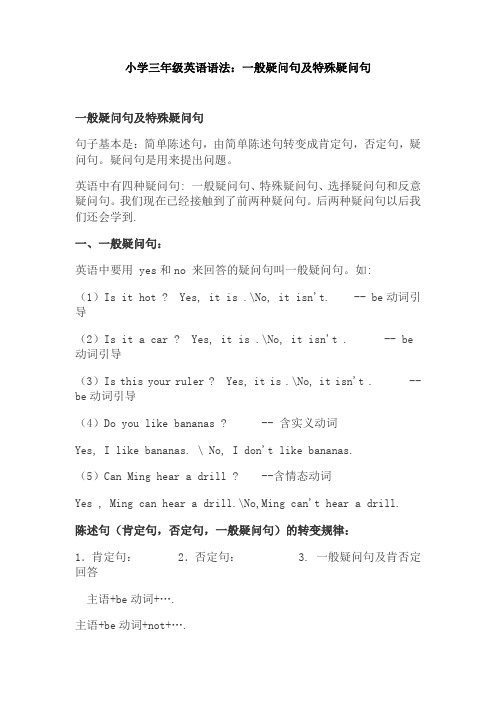
小学三年级英语语法:一般疑问句及特殊疑问句一般疑问句及特殊疑问句句子基本是:简单陈述句,由简单陈述句转变成肯定句,否定句,疑问句。
疑问句是用来提出问题。
英语中有四种疑问句: 一般疑问句、特殊疑问句、选择疑问句和反意疑问句。
我们现在已经接触到了前两种疑问句。
后两种疑问句以后我们还会学到.一、一般疑问句:英语中要用 yes和no 来回答的疑问句叫一般疑问句。
如:(1)Is it hot ? Yes, it is .\No, it isn't. -- be动词引导(2)Is it a car ? Yes, it is .\No, it isn't . -- be动词引导(3)Is this your ruler ? Yes, it is .\No, it isn't . -- be动词引导(4)Do you like bananas ? -- 含实义动词Yes, I like bananas. \ No, I don't like bananas.(5)Can Ming hear a drill ? --含情态动词Yes , Ming can hear a drill.\No,Ming can't hear a drill.陈述句(肯定句,否定句,一般疑问句)的转变规律:1.肯定句: 2.否定句: 3. 一般疑问句及肯否定回答主语+be动词+….主语+be动词+not+….be动词+主语+…?Yes, 主语+be动词./No, 主语+be动词+not.I am a teacher. I am not a teacher. Are you a teacher?--Yes, I am./ No, I am not.My mother is thin. My mother is not /isn'tthin. Is your mother thin?--Yes, she is./ No, she isn't.They are insects. They are not/aren't insects. Are they insects?--Yes. they are./ No, they aren't.主语+情态动词can+…主语+情态动词can+ not+….情态动词can+主语+…?Yes, 主语+情态动词can/No,主语+情态动词can+ notHe can jump. Hecan not/can't jump. Can he jump?--Yes,he can./ No, he can't.主语+动词+….主语+助动词do/does+not助动词do/does+主语+…. 动词原形 +….动词原形?Yes, 主语+助动词do/does.No, 主语+助动词do/does+not.He likes to eat apples. He doesn't like to eat apples. Does he like to eat apples?Yes,he does./ No,he doesn't.We like to eat apples. We don't like to eat apples. Do you like to eat apples?Yes,we do. /No,we don't.二、祈使句:表示请求、命令、建议或劝告等的句子叫祈使句,主语you常省略。
小学英语语法:陈述句变一般疑问句

Yes , she is . No, she isn’t.
3. They are reading books. Yes , they are.
A_re_t_h_ey_r_e_ad_in_g_b_o_ok_s_? No, they aren’t.
4. I am tired.
Yes , I am.
_A_re_y_o_u_t_ir_e_d?___N_o,_I’m not.
Yes , they do.
3.They like fish. Do they_l_ik_e_fi_sh_?_N_o_, t_h_ey_d_o_n’t.
4. Mary likes meat.
Yes ,she does.
Do_e_s_M_a_ry_l_ike__m_ea_t_? __No, she doesn’t.
Can Tom skate?
肯定回答:Yes, he can. 否定回答:No, he can’t.
Can they ride?
肯定回答:Yes, they can. 否定回答:No, they can’t.
口诀:一提二换三照抄 一提:将情态动词提到句首; 二换:将第一人称换成第二人称; 三照抄:陈述句剩下的都照抄
3. This is a ship. Is this_a_s_h_ip_?__N_o_, _it_is_n_’t_.
Yes , it is.
4. Sam is a dog. Is Sam__a_d_o_g_?_N__o,_i_t i_s_n’_t.
Are Jim and May sad?
5. Jim and Mary are sad. _Ye_s_, t_h_ey_a_r_e.____
2)含有情态动词can,will,must,should
小学英语语法---一般疑问句和特殊疑问句

Homework :作业 (划线部分提问)
1.Mike went to Chongqing yesterday. 2.My father went to Shanghai last night. 3.John is playing football in the grass. 4.I go to Xingjiang by plane.
5.Amy likes summer very much.
Thank You !
Mike: Where _____are we going to this year? Mum: we will go to Harbin. When Mike: ______are we going to Harbin? Mum: On 10th Octomber. How Mike: ______do you go to there? Mum: By plane. Mike: Where _____are we going to stay in Harbin? Mum: In Grandma’s big house. What Mike: _____does Grandma like eating? Mum: She likes eggs very much. Mike: Which ______season is the best time to Harbin? Mum: Winter. Mike: Why _____? Mum: Because we can make a snowman there.
Mike: My father.
A How B Where C What D Who 3.A: Was this book in the desk?
小学英语语法一般疑问句和特殊疑问句副本
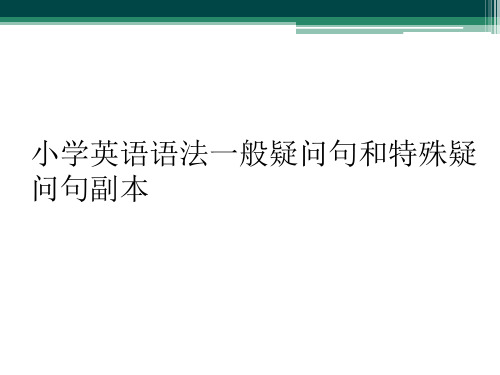
一般疑问句:
表示疑问, 一般答复只有两种可能Yes,……或No,…… 句中没有特殊疑问词。 把be动词提到句首即可。
特殊疑问词
表示疑问,有疑问词〔在开头〕,答复有很多种可能。 常用疑问词: When 什么时间 问时间 What time 什么时间 问详细时间,如几点钟 Who 谁 问人 Whose 谁的 问主人 Where 在哪里 问地点 Which 哪一个 问选择 Why 为什么 问原因 What 什么 问东西、事物 What colour 什么颜色 问颜色 What about 。。。。怎么样 问意见 What day 星期几 问星期几
特殊情况
假如对句子的主语提问!!!! 只要把主语部分换成相应的特
殊疑问词即可,其他部分照 抄!!!
人有了知识,就会具备各种分析能力, 明辨是非的能力。 所以我们要勤恳读书,广泛阅读, 古人说“书中自有黄金屋。 ”通过阅读科技书籍,我们能丰富知识, 培养逻辑思维能力; 通过阅读文学作品,我们能提高文学鉴赏水平, 培养文学情趣; 通过阅读报刊,我们能增长见识,扩大自己的知识面。 有许多书籍还能培养我们的道德情操, 给我们巨大日期 问日期 What for 为何目的 问目的 How 。。。。怎样 问情况 How old 多大年纪 问年纪 How many 多少数量〔可数名词〕 问数量 How much 多少钱;多少数量〔不可数名词〕 问多少钱或数 量〔不可数〕 How about 。。。。怎么样 问意见 How often 多久 问频率 How long 多长时间 问时间长度 How far 多远 问多远;多长间隔
第一步,除了划线部分,把be动词提早,并 大写
Is he ...? 第二步,把划线部分换成相应的特殊词 my father 是人,对应的特殊疑问词是who 第三步,特殊疑问词放在句首
- 1、下载文档前请自行甄别文档内容的完整性,平台不提供额外的编辑、内容补充、找答案等附加服务。
- 2、"仅部分预览"的文档,不可在线预览部分如存在完整性等问题,可反馈申请退款(可完整预览的文档不适用该条件!)。
- 3、如文档侵犯您的权益,请联系客服反馈,我们会尽快为您处理(人工客服工作时间:9:00-18:30)。
一般疑问句的讲解及练习
一、什么是一般疑问句?
以Be动词〔am is are〕,助动词〔do / does/ did / have/has〕,情态动词〔can/must/should〕开头的句子,而且用Yes或No来答复,读升调的句子就是一般疑问句。
译成汉语,都可以带上“吗〞,例如上面三句可分别译为:例:
1〕Is your father a teacher? 你父亲是老师吗?
2〕Catherine like animals? 凯瑟琳喜欢动物吗?
3〕Jenny speak French? 詹妮会说法语吗?
二、由陈述句变一般疑问句的规则:
①第一步“找〞,看看句中有没有be动词〔am/is/are〕,助动词〔do/does/have/has〕,情态动词〔can/must/should〕这些词,如果有,就直接将这些词放在句子的开头,句末打上问号。
1〕找be动词〔am/is/are〕,如果有be动词,就把be 动词提到句子的第一位,其它局部照抄,把最后的句号变成问号。
②注意人称的变化:一变二,二变一,三不变,some变成any
把句子的“我I〞换成〞你’you“
我们we换成你们you
我的my换成你们your
我们的our换成你们的your〞
some变成any
③注意第一个首字母要大写,句子末尾的“句号.〞换成“问号?〞
■由be动词引导的一般疑问句Be(am/is/are)+主语+其它+?
肯定答复:Yes,主语代词+Be动词+句号
否认答复:No,主语代词+be动词+not.
例如:It is rainy today.
→Is it rainy today?
■由情态动词引导的一般疑问句:
情态动词+主语+动词原形+其它+?
〔1〕肯定答复:Yes,主语代词+情态动词+句点〔2〕否认答复:No,主语代词+情态动词+ not . 口诀:一提二换三照抄
一提:将情态动词提到句子开头;
二换:将第一人称换成第二人称;
三照抄:陈述句剩下的都照抄
例句:
①Can you swim?
Yes, I cna./No, I can not. ②Should I walk in the road?
No, you should not.
③We can playfootball.变成一般疑问句:
Can you play football?
④Tom's father can play the piano.
→Can Tom's father play the piano?
■如果句中有没有be动词〔am is are〕,助动词
〔do does have has〕,情态动词〔can〕,则依据谓语动词的形式借助do 或does放句首。
具体方法:如果谓语动词是原型,则借助do 放句首;如果谓语动词是第三人称单数形式,则借助does 放句首,原句的谓语动词要变回原型。
如果谓语动词是过去式,则借did. 需要注意的是,借does或did 后,原句的谓语动词要变回原形。
④
例如:
1〕They go to school by bike .
Do they go to school by bike ?
2〕He goes to school by bike .
Does he go to school by bike ?
3〕The students saw a film yesterday.
→Did the students see a film yesterday?
■如果句中有实意动词have/ has ,且表示有时,可以“借〞也可以“找〞,即可以借do/does放句首,也可以直接把have/ has放句首。
例如:
1〕They have ten apples .
Do they have ten apples ?
Yes , they do . No , they don’t
2〕Have they ten apples ?
Yes , they have .No , they haven’t.
■陈述句变一般疑问句考前须知:
1、如果陈述句中有第一人称,变一般疑问句时肯定要变成第二人称。
I/We变成 you My/Our变成your
例如:
1〕I’m Alice .
Are you Alice ?
Yes, I am.
No, I’m not .
2〕My mother is a nurse .
Is your mother a nurse ?
Yes , she is . No , she isn’t .
2、如果陈述句中有some,变一般疑问句时肯定要变成any。
例如:
There is some water on the table .
Is there any water on the table ?
Yes, there is.
No, there isn’t .
■一般疑问句作答用Yes或No 作答,遵循怎么问怎么答原则。
三、一般疑问句的答复
一般疑问句往往采纳简短答复,共由三局部〔三个单词〕组成,对这三局部〔三个单词〕确实定可以概括例下:
①第一个词:不是Yes就是No。
〔有时依据语气的不同,Yes 可由Sure, Certainly, Of course等替代.NO可由sorry 替代.〕②第二个词:问谁答谁。
即答语中的主语须与问句的主语一致〔但必须用主格代词〕。
例:
1〕Does she clean her room every day?
Yes, she does.
2〕Is Anna′s father a doctor?
No,he isn′t.
■如果主语是 this that,答复时用 it 替代,如果问句中主语these, those,答复时用 they′替代。
③第三个词:用什么问,用什么答。
即沿用问句中的引导词。
Can Jim play soccer?
Yes, he can./
Does Mr Bean speak English?
Yes, he does.
■需要注意问题:
①用 may 引导的问句,肯定答复用may,否认答复用 can′t 或mustn′t,
②用 must 引导的问句,肯定答复用 must,否认答复用needn′t.
例:
1〕May I go to the park now?
Yes, you may.
No, you mustn′t
2〕Must I wash my clothes now?
Yes, you must. /
No, you needn′t.
③用No开头作否认答复时,结尾要加上 not。
因为答复必须是三局部,所以否认答复必须缩写,而肯定答复不能缩写。
例:Did Thomas come here yesterday?
Yes, he did./ No ,he didn′t.
Is Lin Lin in Class 3?
Yes, she is. / No, she isn′t.或〔No, she′s not〕.。
